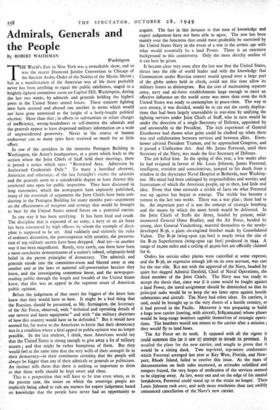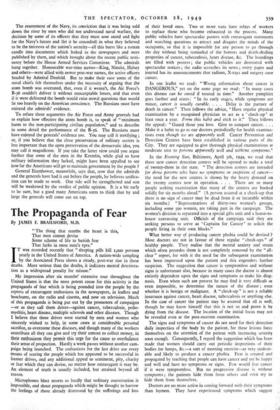Admirals, Generals and the People
By ROBERT WAITHMAN Washington THE World's Fair in New York was a remarkable show, and so was the recent Diamond Jubilee Convention in Chicago of the Ancient Arabic Order of the Nobles of the Mystic Shrine ; but as a manifestation of the American way of life there probably never has been anything to equal the public exhibition, staged in a brightly-lighted committee room on Capitol Hill, Washington, during the last two weeks, by admirals and generals holding the highest posts in the United States armed forces. These eminent fighting men have accused and abused one another in terms which would not have gone unnoticed at the height of a hotly-fought political election. More than that ; in efforts to substantiate or refute charges of inefficiency, wrong-hcadcdness or self-interest the admirals and the generals appear to have dispensed military information on a scale of unprecedented generosity. Never in the course of human endeavour can so many spies have received so much for so little effort.
In one of the corridors in the immense Pentagon Building in Washington, the Army's headquarters, at a point which leads to the section where the Joint Chiefs of Staff hold their meetings, there is posted a notice which says: "Restricted Area. Admission by Authorised Credentials Only." To many a horrified observer, American and otherwise, of the last fortnight's events the admirals and the generals seem to a considerable degree to have thrown this restricted area open for public inspection. They have discussed in long statements, which the newspapers have copiously published, many of the essentials of arguments the Joint Chiefs have been con- ducting in the Pentagon Building for many months past—arguments on the effectiveness of weapons and strategy that would be brought to bear by the United States armed forces on a potential enemy.
In one way it has been terrifying. It has been loud and crude. The discipline that is expected of an army, a navy or an air force has been renounced by high officers by whom the example of disci- pline is supposed to be set. And suddenly and violently the rules of ordinary discretion, the preoccupation with security, the preserva- tion of top military secrets have been dropped. And yet—in another way it has been magnificent. Rarely, very rarely, can there have been a more conclusive demonstration of a nation's inbred, religiously-held belief in the purest principles of democracy. The admirals and generals strode into the committee-room and blasted away at one another and at the laws of national self-preservation because they knew, and the investigating committee knew, and the newspaper- reading public through the length and breadth of the United States knew, that this was an appeal to the supreme court of American public opinion.
Before the judgement of that court the biggest of the brass hats knew that they would have to bow. It might be a bad thing that the Russians should be presented, as Mr. Symington, the Secretary of the Air Force, observed, with " technical and operating details of our newest and latest equipment " and with " the military doctrines of how this country would have to be defended." But it would have seemed far, far worse to the Americans to know that their democracy was in a condition where a final appeal to public opinion was no longer possible. In the last analysis, I think, most Americans would say that the United States is strong enough to give away a lot of military secrets ; and that might be rather bumptious of them. But they would feel at the same time that the very wells of their strength lie in their democracy—in their continuous certainty that the people will always be bigger than any of their admirals or generals or politicians. An instinct tells them that there is nothing so important to them as that these wells should be kept sweet and clean.
This is a proposition that will have to be true even when, as in the present case, the issues on which the sovereign people arc implicitly being asked to rule are matters for expert judgement based on knowledge that the people have never had an opportunity to
acquire. The fact in this instance is that men of knowledge and expert judgement have not been able to agree. The row has been mainly over the functions that could most profitably be exercised by the United States Navy in the event of a war in the atomic age with what would essentially be a land Power. There is an extensive background to this controversy. Only the most sketchy outline of it can here be given.
It became clear very soon after the last war that the United States, thrust into the role of world leader and with the knowledge that Communism under Russian control would spread over a large part of the globe unless held in check, could not this time allow its military forces to disintegrate. But the cost of maintaining separate army, navy and air-force establishments large enough to exert an effective influence on the world scene was more than even the rich United States was ready to contemplate in peace-time. The way to save money, it was decided, would be to cut out the costly duplica- tions that had been largely unavoidable in war-time by unifying the fighting services under Joint Chiefs of Staff, who in turn would be under the direction of a single Secretary of Defence, appointed by and answerable to the President. The rich experience of General Eisenhower had shown what gains could be chalked up when there was real collaboration between services and between allies. Eisen- hower advised President Truman, and he approached Congress, and it passed a Unification Act. And Mr. James Forrestal, until then Secretary of the Navy, was made the first Secretary of Defence.
The job killed him. In the spring of this year, a few weeks after he had resigned in favour of Mr. Louis Johnson, James Forrestal, intelligent, sensitive and conscientious, jumped to his death from a window in the skyscraper Naval Hospital at Bethesda, near Washing- ton. His mind had been unhinged by responsibilities and worries and frustrations of which the American people, up to then, had little real idea. From that time onwards a trickle of facts on what Forrestal was up against has begun to emerge. The trickle has become a torrent in the last two weeks. There was a war plan ; there had to be. An important part of it was the concept of strategic bombing and the means by which the atom bomb would be delivered. In the Joint Chiefs of Staffs the Army, headed by patient, mild- mannered General Omar Bradley, and the Air Force, headed by young, alert General Vandenberg, married themselves to the newly- developed B-36, a giant six-engined bomber made by Consolidated Vultee. The B-36 (wing-span 230 feet) is nearly twice the size of the B-29 Superfortress (wing-span 141 feet) produced in 1944. A range of to,000 miles and a ceiling of 40,000 feet are officially claimed for it.
Orders for certain other planes were cancelled at some expense, and the B-36, an expensive enough job on its own account, was cast for the star role. Bat not with the approval of the Navy, headed by quiet but dogged Admiral Denfeld, Chief of Naval Operations, the third member of the Joint Chiefs. The Navy was not ready to accept the thesis that, since war if it came would be fought against a land Power, the naval assignment should be diminished so that its principal tasks would be to keep the sea lanes open against hostile submarines and aircraft. The Navy had other ideas. Its carriers, it said, could be brought up to the very shores of a hostile country, as it had proved in the Pacific. Moreover it was preparing to build a huge new carrier (costing, with aircraft, $189,000,000) whose planes would be long-range bombers capable themselves of strategic opera- tions. The bombers would not return to the carrier after a mission ; they would fly to land bases.
The Air Force set its teeth. It opposed with all the vigour it could summon this (as it saw it) attempt to invade its province. It assailed the plans for the new. carrier, and sought to prove that it would be a sitting duck. Two top-level, top-secret conferences which Forrestal arranged last year at Key West, Florida, and New- port, Rhode Island, failed to resolve this issue. As the mass of documentation on both sides increased, as attitudes solidified and tempers frayed, the very hopes of unification of the services seemed to be slipping away. At last, worn out and on the edge of his mental breakdown, Forrestal could stand up to the strain no longer. Then Louis Johnson took over, and with more resolution than tact swiftly announced cancellation of the Navy's new carrier.
The resentment of the Navy, its conviction that it was being sold down the river by men who did not understand naval warfare, the decision by some of its officers that they must now stand and fight for the Navy's future and (let it be conceded) in what they believed to be the interests of the nation's security—all this burst like a roman candle into documents which leaked to the newspapers and were published by them, and which brought about the recent public testi- mony before the House Armed Services Committee. The admirals hung together. Honourable war-time names—King, Nimitz, Halsey and others—were allied with newer post-war names, the active officers headed by Admiral Denfeld. But to make their case some of the naval chiefs felt themselves under the necessity of arguing that the atom bomb was overrated, that, even if it weren't, the Air Force's B-36 couldn't deliver it without unacceptable losses, and that even if it were delivered the bomb would raise moral questions that would lie too heavily on the American conscience. The Russians must have enjoyed the admirals' evidence.
To refute chest arguments the Air Force and Army generals had to explain how effective the atom bomb is, to speak of " minimum harm to the non-participating civilian population," and to describe in some detail the performance of the B-36. The Russians must have enjoyed the generals' evidence too. You may call it terrifying ; or, if you believe that the close preservation of military secrets is less important than the open preservation of the democratic idea, you may call it magnificent. If you take the latter view could you argue further that some of the men in the Kremlin, while glad to have military information they lacked, might have been appalled to sec how far the Americans will go to maintain government by the people ?
General Eisenhower, meanwhile, says that, now that the admirals and the generals have had it out before the people, he believes unifica- tion can be made to work. One side will be strengthened and one will be weakened by the verdict of public opinion. It is a bit early to be sure, but a good many Americans seem to think that by and large the generals will come out on top.







































 Previous page
Previous page